康德的道德理论PPT课件
合集下载
康德的义务伦理学
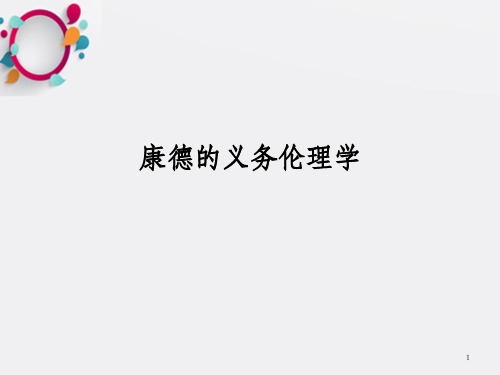
• 系统阐述了“义务伦理学”的规则非结果论。
3
• 社会制定不能诉诸外在于人的理性,否则就是他律 (heteronomy ),而必须基于理性所形成之法则,只有如 此才能保障自由和正义,对康德而言,所谓自由把个人特 殊的欲望和喜好从属于普遍的道德律之下的能力。
• 康德是第一个将“责任”(duty)这个概念当成道德的核 心概念的哲学家 。
2
• 包涵若干道德原则。 康德的这种力量和依普遍正义原则而行的责任为“自律”或“自 主性”(autonomy),在他的政治理论中,自主性就是给予个人 道德权威和地位,对抗政府的力量。
• 在此必须强调的是,康德认为自律的基础不在人的情感,因为欲 望是偶然的,而且会因人、因时而异,所以不能作为维持社会机 制、制定普遍规则的稳定基础。
• 将上述准则普遍化,所得到的是GM(a1):任何人当持续生存会带来苦多乐 少时,他将基于自爱而自杀。
27
例1:禁止自杀
• 由于康德认为自杀是错,所以他要证明a1的行为 者不能一致的意愿GM(a1)成为一个自然法则, 其论证如下:
• ①GM(a1)不能成为一个自然法则,因为它和我 们所认知的自然法则不一致,自爱在自然体系中 有一个特殊功能,即促进生命发展和延伸,因此 如果基于自爱而消灭生命,则是自我矛盾。
32
一贯性与义务的冲突
• 然而,假定不食言会导致某人被严重伤害甚至被 杀死。按照康德的说法,我们必须遵守诺言;又 由于结果无关紧要,无辜者就只有受伤害或被杀 死了。
• 但实际上,遵守诺言与防止无辜者受害或被杀, 哪个更重要呢?这里的问题之一是,康德从未告诉 我们,为了服从不同的却同样绝对的规则,如何 在相互冲突的义务间进行抉择呢?我们有义务不 杀人,也有义务不食言,但当二者相互冲突时, 何者优先呢?
3
• 社会制定不能诉诸外在于人的理性,否则就是他律 (heteronomy ),而必须基于理性所形成之法则,只有如 此才能保障自由和正义,对康德而言,所谓自由把个人特 殊的欲望和喜好从属于普遍的道德律之下的能力。
• 康德是第一个将“责任”(duty)这个概念当成道德的核 心概念的哲学家 。
2
• 包涵若干道德原则。 康德的这种力量和依普遍正义原则而行的责任为“自律”或“自 主性”(autonomy),在他的政治理论中,自主性就是给予个人 道德权威和地位,对抗政府的力量。
• 在此必须强调的是,康德认为自律的基础不在人的情感,因为欲 望是偶然的,而且会因人、因时而异,所以不能作为维持社会机 制、制定普遍规则的稳定基础。
• 将上述准则普遍化,所得到的是GM(a1):任何人当持续生存会带来苦多乐 少时,他将基于自爱而自杀。
27
例1:禁止自杀
• 由于康德认为自杀是错,所以他要证明a1的行为 者不能一致的意愿GM(a1)成为一个自然法则, 其论证如下:
• ①GM(a1)不能成为一个自然法则,因为它和我 们所认知的自然法则不一致,自爱在自然体系中 有一个特殊功能,即促进生命发展和延伸,因此 如果基于自爱而消灭生命,则是自我矛盾。
32
一贯性与义务的冲突
• 然而,假定不食言会导致某人被严重伤害甚至被 杀死。按照康德的说法,我们必须遵守诺言;又 由于结果无关紧要,无辜者就只有受伤害或被杀 死了。
• 但实际上,遵守诺言与防止无辜者受害或被杀, 哪个更重要呢?这里的问题之一是,康德从未告诉 我们,为了服从不同的却同样绝对的规则,如何 在相互冲突的义务间进行抉择呢?我们有义务不 杀人,也有义务不食言,但当二者相互冲突时, 何者优先呢?
第四讲道义论

•
善良意志的规律就是定言命令。康德 从善良意志概括出责任规范,责任又分为 三个命题,其中包括了爱好和责任;准则 和规律;个别和一般的关系。这些关系中 贯穿一个总的原则,即爱好要服从责任, 准则要服从规律,个别要服从一般。把这 些关系规定下来,就形成了善良意志的规 律即定言命令。 这就是 “除非我愿意自己 的准则也变成普遍规律,我不应行动”, 这就是善良意志的规律,也是道德最高原 则的第一个公式。
1、善良意志
• 康德认为,“意志是按照规律概念而行动的 能力”;“善就是理性在不受外来影响之下,认 为在实践上是必然的东西”。 “善良意志是指按 照善的意志的概念而行动的能力”。 • 其一、善良意志是唯一无条件的善的东西, 它也是其他一切可以成为善的东西的条件。 • 其二、善良意志在于意愿的善,它是自在的 善。 • 实践理性的真正使命就在于产生其自身就是 善良的意志。这就是说,理性不仅是为了幸福, 而是为了追求更高的理想,这种理想是超越或在 个人的意图之上的。
道德法则的定言命令都具有这样一些形式上的特征: • 第一,“普遍性公式”或“形式公式”:“要 只按照你同时认为也能成为普遍规律的准则去行 动”,也就是说,“你的行动,要使你的准则通过 你的意志上升为普遍的法则”。 康德把责任分为两大类:一类是从责任的对象 上来说,责任可以分为我们对自己的责任和他人的 责任,另一类则按责任的约束性来分,有完全责任 和不完全责任。 (1)对自己的完全责任(保存自己的生命)。 (2)对他人的完全责任(信守对别人的诺言)。 (3)对自己的不完全责任(发展自己)。 (4)对他人的不完全责任(帮助他人)。
按照契约论的观点,最理想的方式是,由从 事社会合作的自由而平等的公民所达成的协议来 决定该观念。但是,若想让人们就正义观念达成 协议,存在着两个困难:一是人们处于特殊的社 会条件之中并具有特殊的处境,其思想难免带有 某种偏见;二是人们在社会中占有的地位和拥有 的权力是不同的,这就意味着某些人比其他人更 有优势。 罗尔斯是借助“原初状态”和“无知之幕”来 克服这两个困难的。
康德论教育学新版教育课件
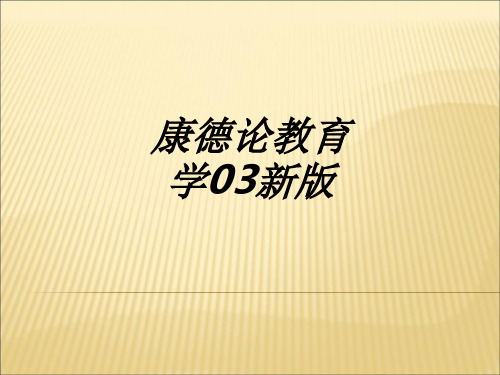
对儿童品格的培养
服从:服从可以来自强制,这时它是绝对的。 也可以来自信赖,而这是另一种类型的服从了。 前者使儿童为遵守公民法则做准备,后者让儿童 自发的遵循权威,规范等。
诚实:它是品格的根本特征与本质。有些儿童 有撒谎的倾向,这往往是源于一种生动的想象力。
让孩子戒除这种习惯是父亲的事,因为母 亲们通常认为这无关大局,她们常常只会看到孩 子的天赋与能力,并沾沾自喜。
有些父母总是拒绝孩子的一切要求。 以锻炼他们的耐性。应该给予儿童足够的东 西后才能说:这对你来说已经足够了。
当孩子想要哭喊来迫使大人做什么时, 可以不予理会。当他友好的要求时,对他有 利的东西就应该给他。
无谓地荒嬉和无休止的爱抚不必那些嘲 弄要好多少。这暴露了父母的弱点,使他们 在孩子那里失去应有的敬重。
康德论教育 学03新版
作者简介
伊曼努尔·康德 德国思想家、哲学家、 天文学家、星云说的创立者之一,德国古典哲 学的创始人。他开启了德国唯心主义和康德主 义的诸多流派,被认为是对现代欧洲最具影响 力的思想家之一。
语 录
我是孤独的,我是自由的,我就是自己 的王。
我们越是忙越能强烈地感到我们是活着 的,越能意识到我们生命的存在。
关于儿童记忆力的培养
“我们能记住多少,就知道多少。”因此 记忆力的培养非常重要。
人们或者是死记硬背,或者是通过交往来 学习语言,而后者对于学习活的语言是最好的 方法。背单词的确是必须的,但……
让儿童读小说是最不好的,因为在读这种 东西的时候,除了把它放在眼前消遣外,不再需 要其他能力。读小说会减弱记忆力,记住小说内 容向人复述很可笑。(??)
襁褓:
我们为了方便,把孩子包的像木乃伊一样。 而美洲的野蛮民族则把婴儿放在地上挖的坑里, 然后撒上腐烂树木的粉末。这样尿和其他东西 就会被吸收。这样婴儿可以保持干燥。
康德ppt课件共37页PPT

例二:
假如有个人看见别人受苦而不去帮助, 心想:这干我什么事呢?让各人随他的天命 受苦吧;我不抢他的东西,不羡慕他的福气, 我也不想出力去增加他的福利。康德认为, 这个人所遵循的规则不能被普遍化,所以是 不道德的。他产生如此想法的意志一定会导 致自相矛盾,——人的一生难免会遇到急需 他人同情和帮助的时候,此时你还同意“不 帮助人”的律令吗?
虽然康德为共和政体的即代议制的政府给 定的条件较为宽泛,但他强调必须以同意为基 础。
➢对待“得到同意”的政府和法律 (1)既强调服从的道德义务; (2)也承认反抗和革命的道德权利。
➢人们之所以有服从法律的道德义务 (1)在先前的选择阶段,一个政府可能得到 理性的同意,或者我们已经理性地选择了它。
(2)我们因享受了政府提供的好处而表示 了同意,而这些好处可能是他人做出牺牲的结 果,所以当轮到我们牺牲时,我们理应“义不 容辞”地服从。对于我指望别人服从的规则, 我自己却不服从,这是不公正的行为。
康德认为,公正法则是确保社会和平与 和谐的充要条件,它是在集体选择的情况 下,所有理性存在物都会同意并签署的 “社会契约”。
康德所说的“社会契约”,不是历史 的猜测,而是理性决定的理想模式。
社会契约无需假定为历史事实,实际上 它不是事实,并非我们的民族曾经实施过 此类行为,并且留下有关这一契约的口头 的或书面的文献。
求道德本身的目的而制定的道德原则。
“他律”—指依据外界事物或情感冲动、 为追求道德之外的目的而制定的道德原则。
意志—主体决定自己依照规律的概念去行 动的能力,实际上就是理性的自决实践能力。
目的----意志自决所依照的“规律的概念” 的根据,这个最终的根据就是目的。
康德认为,目的不是通常所说的主观目 的。如果目的是主观的,那就意味着它只是 行为所要达到的具体目标,只是作为行为之 所以可能的条件而成立的。这种主观目的必 然是特殊的、偶然的、不具有普遍必然性的, 因而只属于实现更高目的的手段,作为实践 规则,它只是在同行为者的情欲的关系中表 现出价值,因而只有相对价值。
康德 哲学.ppt
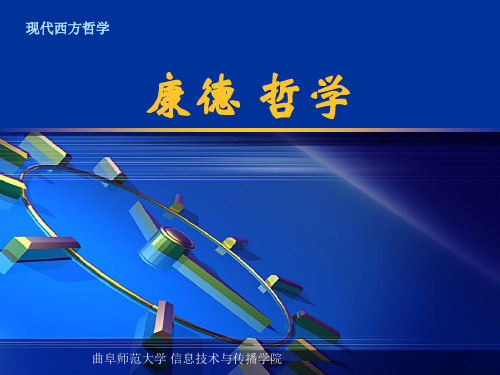
反题:没有自由,世界上的一切都服从于 自然因果律
对现象领域的规定
四、实践理性批判
人类 理性
理论理性:认识功能
自然法则
人 不得不服从
应该遵从
实践理性:意志功能
道德法则
四、实践理性批判
康德是把实践范畴引入哲学的第一人,其实 践仅限于伦理学范围
自然法则体现为以“是”为系词的叙述式, 理性法则乃是由“应该”联结的命令式
五、判断力批判
美学
康德是西方美学史上开宗立派的大师,从 他之后美学才真正成为独立的学科
康德的美学贡献与其审美经验无关,完全 是出于其哲学理论需要的纯粹理论思辨的 结果。
五、判断力批判
美学 审美判断不同于逻辑判断,它基于美
感而不是范畴 审美判断关涉的是主体对事物的纯粹
形式的把握,与被把握的对象没有直 接关系(事物之美与事物本身的性质 无关,而是因为它符合了主体的某种 形式,引想主观上愉快的美感)
知识以判断为基本单位,而判断就是以某种形式把不 同的表象或概念联结(综合)在一起。
综合的三重作用:直观中把握性的综合;想象中再现 性的综合;概念中认知性的综合
认识的对象只是表象,即把不同的表象结合于一身的 同一性(对象概念)→意识的同一性→自我的同一性 为其基础和前提→一切认识之最高的根据就是先验主 体的自我同一性。
先验分析论 三、纯粹理性批判
客观演绎:从自我的先验同一性出发,通 过自我意识与对象意识之间的关系说明范 畴对经验的客观有效性
自我的先验同一性:我思伴随着我的一切表象 自我意识还必须以对象之综合的统一性为前提 范畴作为先验自我之综合统一功能的体现乃是
自我与对象之间的“中介” 知性范畴是形成经验对象的先天条件
对现象领域的规定
四、实践理性批判
人类 理性
理论理性:认识功能
自然法则
人 不得不服从
应该遵从
实践理性:意志功能
道德法则
四、实践理性批判
康德是把实践范畴引入哲学的第一人,其实 践仅限于伦理学范围
自然法则体现为以“是”为系词的叙述式, 理性法则乃是由“应该”联结的命令式
五、判断力批判
美学
康德是西方美学史上开宗立派的大师,从 他之后美学才真正成为独立的学科
康德的美学贡献与其审美经验无关,完全 是出于其哲学理论需要的纯粹理论思辨的 结果。
五、判断力批判
美学 审美判断不同于逻辑判断,它基于美
感而不是范畴 审美判断关涉的是主体对事物的纯粹
形式的把握,与被把握的对象没有直 接关系(事物之美与事物本身的性质 无关,而是因为它符合了主体的某种 形式,引想主观上愉快的美感)
知识以判断为基本单位,而判断就是以某种形式把不 同的表象或概念联结(综合)在一起。
综合的三重作用:直观中把握性的综合;想象中再现 性的综合;概念中认知性的综合
认识的对象只是表象,即把不同的表象结合于一身的 同一性(对象概念)→意识的同一性→自我的同一性 为其基础和前提→一切认识之最高的根据就是先验主 体的自我同一性。
先验分析论 三、纯粹理性批判
客观演绎:从自我的先验同一性出发,通 过自我意识与对象意识之间的关系说明范 畴对经验的客观有效性
自我的先验同一性:我思伴随着我的一切表象 自我意识还必须以对象之综合的统一性为前提 范畴作为先验自我之综合统一功能的体现乃是
自我与对象之间的“中介” 知性范畴是形成经验对象的先天条件
康德哲学

《纯粹理性批判》讲的是知识的
来源与知识在什么条件下才可能形 成的问题。 他认为知识是先天的形式与感性材料 结合而成,这构成了他的先验唯心 主义的主要部分。这一部分即一般 人所讲的哲学。
《实践理性批判》是用他的先验唯 心主义去研究人的道德行为原则,说 明道德原则为什么是先天的、先验的。 这一部分即一般人所说的伦理学。
• 是认识中感性材料的来源,自在之物对感官刺激才
能产生感觉。自在之物是已有的、先在的。不同于 贝克莱的心外无物。
• 是本体,存在于彼岸世界,不可认识,是认识的一
种界限。
• 是理念。自在之物不是认识的对象但却是理论思考
的对象。
• 物自体只能思不能知,对认识起范导的作用。
先验感性论 • 感性与感性直观
不通,我们不妨像哥白尼那样换
一个角度,把知识与对象之间的 关系颠倒过来,看一看让对象符 合知识亦即主体固有的认识形式 会有什么结果。
• 在康德看来,问题由此便得到了完满
的解决:一方面,我们的知识的确必 须建立在经验的基础之上,但是另一 方面,进行认识活动的主体本身亦具 有一整套认识形式,由于这些认识形 式在经验之先并且是经验的条件,从
康德哲学
• 康德的生平及其哲学特
点
伊曼努尔·康德 (1724——1804)出身于一 个小手工业者和小商人的家 庭。他生在东普鲁士的哥尼 斯堡,在那里上了小学、中 学、大学,毕业后作了九年 的家庭教师,1755年到哥尼 斯堡大学任教四十年,1797 年退休。
19世纪德国浪漫主义诗人和散文家海 涅对康德及康德哲学作出评价。他在《论 德国宗教和哲学的历史》一书中,用极其 生动的语言描绘了康德晚年的平淡而安定 的有规律的生活。他说:
而言表现为个别、偶然和相对的。
伦理学ppt课件
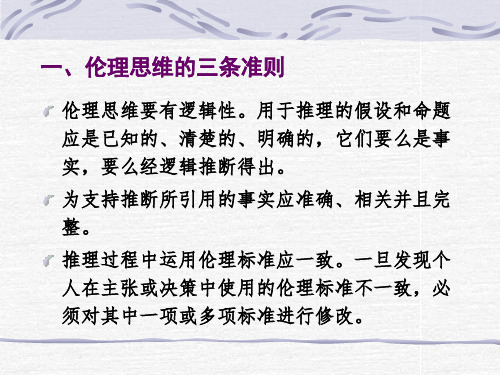
谢谢!
6、“大多数人”概念如何界定?最大幸福又如何计算?缺乏有 效的运算数学工具。
7、忽视了正义理论要求的分配公平和权利理论关注的不可剥夺 的人权。
康德的道德绝对命令(categorical imperative)的三个公式:
康德的三个公式,首先关注的是绝对命令的形式,其次 关注的是它的内容(内涵),第三条是将前两者联系起来 。因此又可简化为两条绝对律令。他的公式是: 1、你必须如此行事,你的这种行为方式可以作为所有 人的行动典范; 2、总是将他人当作目的,而不仅仅是当作手段; 3、仿佛你是目的王国中的一员而行动。
3、效用最大化可能对被(有意或无疑忽视的)个体造成很大危害。 如美国中部大西洋铁路是靠许多报酬极低的中国劳工建成的,这 一行为产生了显著的正向净效用,提高了运输能力,推动了工业 发展,增强了国防,但是,这些收益是以中国劳工付出生命和无 偿劳动(永久拖欠工资补偿)的代价为基础的。
4、一个决策产生的效用对某个集团内各成员是不均衡的。1美 元永远是1美元,但它对一个穷人的效用比对一个富人的效用 大。
功利主义的理论缺陷:
功利主义提出的“好的”标准是所有人的福利最大化,但 人们对此并无统一的定义。
对于由谁来决定没有统一意见。不同的决策者对于同一事 宜功利最大化计算结果,并不一致,事实上话语霸权或者 权力,发挥着主导作用。
不是判断行为本身的对错,而是判断其结果。罗尔斯认为 ,一个人在别人的不自由中得到的快乐本身是错误的,那 些需要违反正义才能获得的利益本身毫无价值。
Being kind is more important than being right. 善良比真理更重要.
You should never say no to a gift from a child. 永远不要拒绝孩子送给你的礼物.
伦理学课件——美德论(上)

道德的基本问题是:应当做一个什么样的人?(德 性论) 观念基础:道德之为道德,在于一个人的品质,只 有具备了内在的品质,才是一个有道德的人,只有 有道德的人才能有道德的行为。 理论模式:如何实现自我完善。
3、道德教育实践上思路的不同 美德伦理把重点放在道德人格培养上。 道德人格培养最有效的方式:情感激发和榜样示范。
ห้องสมุดไป่ตู้
规范伦理把重点放在道德规范的论证、传授以及道 德评价和认知能力的培养上。 道德教育的最佳途径:明辨规则。
美德伦理的特征: 第一,内在性。德性内在地要求个体做或不做某种 行为,而规范、制度则是从外部规定个体的行为。 第二,自律性。个体的自我约束行为。 第三,超越性。 德性能够超越既有的规范、制度的 局限,在规范、制度不起作用时发挥独特的作用。 第四,丰富性。道德生活具有丰富性,非建立在单 一的因素上。 第五,有机性。每一个道德决定都离不开行动者自 身所具有的判断力和实践智慧。它不是机械的,它 是情景的、背景的和有机的。
2、问题意识不同 道德的基本问题是:一个人应当做什么以及应当怎 样做?(规范论) 观念基础:做什么样的人,是个人自己的选择。任 何其他人、社会都没有权利干涉个人的这一权利; 伦理学自然也就没有必要去关注和研究人的内在道 德品质,更不应当、也没有权利为所有人提供某种 共同的、普遍的道德品质的模式。 理论模式:寻找行为的普遍“应当”。
以规则、行动为中心的理论,面临的问题:
1、不同的理论,导致人们选择时的困难,评价时 的无奈。导致社会共同道德信念及共同价值观念的 缺乏。 2、唯规则论,而非主观愿意。
伦理学ppt课件

■ 第三种观点认为道德是人类社会自身的产物,是人类所规 定的行为规范而已,并非是超越于人类社会的规则。
■ 在电影《模仿游戏中》,艾伦•图灵是著名 的同性恋之一,被指控“明显的猥亵和性 颠倒行为”。在著名的公审后,他被给予 了两个选择:坐牢或荷尔蒙疗法。他选择 了荷尔蒙注射(化学阉割),并持续了一 年。英国于1967年至1984年才逐渐接受了同 性恋合法,直到2013年12月24日,英国司法 大臣宣布英国女王伊丽莎白二世赦免1952年 因同性恋行为被定罪的艾伦•图灵。
■ 道德主要靠舆论和宣传来保证实施,而法律则是运用国家机 器强制执行。另外,道德不仅涉及行为规范,也涉及人的内 心,而且表述较为宽泛和模糊。但是道德和法律之间又有联 系,道德是法律的有益补充,在法律涉及不到的地方,就靠 道德来规范社会的协调运作。
法律与道德的冲突
■ 法律与道德的冲突成为了电影中的一个重要议题, 当法律有被悖于人伦或情理时该如何抉择?电影 《守法公民》和《危情三日》都描述了自己的妻 子受到伤害却无法得到法律的公正判决,主人公 只能代替法律来行使公正,变身为强大战士的故 事。
■ 影片《朗读者》中描述了集中营的看守汉娜在受到审判时, 她不认为自己是在作恶。当法官问汉娜,眼看着三百名犹 太人即将被大火活活烧死,为何手握钥匙的她却不开门, 她的回答是:“我的工作是押送犯人,不能让她们逃跑。 要是打开门出现混乱,我们得负责。”
■ 电影《狗镇》反映了如果人们在冷漠和麻木之中,可以完 成多么可怕的平庸之恶。
■ 德国电影《自由意志》中讲述了西奥是一名强奸 犯,性欲极度强烈的他被送往精神病院强行接受 治疗。九年过去了,西奥从精神病院释放出来, 经历了长期的囚禁和治疗之后,他一直试图努力 回到正常的生活轨道,自由意志能否战胜病态的 生理本能?
■ 在电影《模仿游戏中》,艾伦•图灵是著名 的同性恋之一,被指控“明显的猥亵和性 颠倒行为”。在著名的公审后,他被给予 了两个选择:坐牢或荷尔蒙疗法。他选择 了荷尔蒙注射(化学阉割),并持续了一 年。英国于1967年至1984年才逐渐接受了同 性恋合法,直到2013年12月24日,英国司法 大臣宣布英国女王伊丽莎白二世赦免1952年 因同性恋行为被定罪的艾伦•图灵。
■ 道德主要靠舆论和宣传来保证实施,而法律则是运用国家机 器强制执行。另外,道德不仅涉及行为规范,也涉及人的内 心,而且表述较为宽泛和模糊。但是道德和法律之间又有联 系,道德是法律的有益补充,在法律涉及不到的地方,就靠 道德来规范社会的协调运作。
法律与道德的冲突
■ 法律与道德的冲突成为了电影中的一个重要议题, 当法律有被悖于人伦或情理时该如何抉择?电影 《守法公民》和《危情三日》都描述了自己的妻 子受到伤害却无法得到法律的公正判决,主人公 只能代替法律来行使公正,变身为强大战士的故 事。
■ 影片《朗读者》中描述了集中营的看守汉娜在受到审判时, 她不认为自己是在作恶。当法官问汉娜,眼看着三百名犹 太人即将被大火活活烧死,为何手握钥匙的她却不开门, 她的回答是:“我的工作是押送犯人,不能让她们逃跑。 要是打开门出现混乱,我们得负责。”
■ 电影《狗镇》反映了如果人们在冷漠和麻木之中,可以完 成多么可怕的平庸之恶。
■ 德国电影《自由意志》中讲述了西奥是一名强奸 犯,性欲极度强烈的他被送往精神病院强行接受 治疗。九年过去了,西奥从精神病院释放出来, 经历了长期的囚禁和治疗之后,他一直试图努力 回到正常的生活轨道,自由意志能否战胜病态的 生理本能?
德论.第二章

责任,作为道德规范,是在道德义务的基础上 产生的又一次升华。如果说道德义务还较多地表现 为外在道德要求,那么责任就已经把这种外在要求 转化为内在道德要求。 因为责任是人们主动意识到的义务,它具有着 良心的成分。换言之,道德义务与道德责任,是一 种“绝对命令”在人之外和在人之内的两种表现形 式。由此可见,责任所包含的道德自觉的强制力和 道德理性,是所有规范中最多的,也是社会的道德 要求和个人的道德信念、道德需要结合得最紧密的。 因此,责任在道德规范的整个表现体系中,是处于 最高级层次的道德规范。
弗洛伊德说,原始民族对禁忌事物必然采取一 种矛盾的态度。在潜意识中,他们极力想去触犯它, 却又怕这样做;他们恐惧,正是因为他们想这样做, 之所以没有这样做,只是由于恐惧战胜了欲望罢了。 所以,禁忌是针对人类某些强烈的欲望而由外力所 强迫介入的原始禁制。然而,对禁忌破坏的欲望仍 然存留在人类的潜意识里,每个遵守禁忌的人都怀 有一种矛盾的心态。(如婚制禁忌、鬼神禁忌等) 原始民族的一些常见的禁忌,包括:(1)对敌 人的禁忌;(2)对统治者的禁忌;(3)对死人的 禁忌等。还有对神灵的禁忌。
佛家还有“十善”说 十善:是在五戒的基础上建立的,约身、口、意三 业分成十种。反之,称为十恶。 身业有三种:不杀、不盗、不邪淫; 口业有四种:不妄语欺骗、不是非两舌、不恶口伤 人、不说无益绮语; 意业有三种:不贪、不嗔、不愚痴。 不贪欲者,谓不贪着情欲尘境,即是止贪之善。既 不贪欲,当行清净梵行之善也。 不嗔恚者,谓不生忿怒之心,嗔恨于人,即是止嗔 之善。既不嗔恚,当行慈忍之善也。 不邪见者,谓不偏邪异见,执非为是,即是止邪见 之善。既不邪见,当行正信正见之善也。
在《图腾与禁忌》一书中,弗洛伊德提出了关 于道德起源问题的假说:在人类的幼年时代,人们 曾生活在这样一种社会之中,在那里,凶恶的父亲 独占了全部女性,并把成年的儿子们都驱逐出部落。 有一天,被赶走的兄弟们聚合在一起,杀死并吞食 了自己的父亲……。当这一切都结束以后,这些儿 子们又都后悔了,他们重新怀念起自己的父亲,并 开始执行两项“决议”:第一,祭奉象征着父亲的 某种动物,禁止无故伤害它;第二,凡本部族的男 子,一概不准在部族内占有女性。于是,原始图腾 崇拜和外婚制便由此产生,而这些原始禁忌正是最 初社会道德的雏形。 目前,很多的人类学以及文化伦理学都认可, 图腾是原始人用以规范其思想与行为的重要载体, 具有道德的功能,它就是原始人的道德表现形态。
康德的伦理学
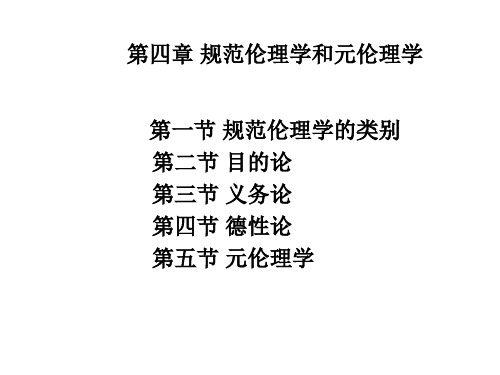
——林火旺《伦理学入门》
• 3、人是目的 • 你的行动,要把你自己人身中的人性,和其他 人身中的人性,在任何时刻都永远看做是目的, 决不只能看做是手段 • Act in such a way that you always treat humanity, whether in your own person or in the person of any other, never simply as a means, but always at the same time as an end.
•
其六,义务论不能与自然科学和社会科学等其他 学科很好地融合 • 康德强调道德是理性存在者的事务,理性是将人 类与自然界区分开来的根本标志。因此,绝对命令的 人性表述直接排除了对人类以外对象的尊重。但是, 从进化论的角度,这一划分是没有根据的。人类的理 性能力与许多高等动物相比,差别仅仅是程度上的。 罗斯的道德理论很大程度上借重他 • 的直觉主义道德认识论,但道德直 觉是一种什么样的认识能力?是一 种人类的自然官能,还是另一种超 自然的能力?这种能力能否在进化 论的框架中得到说明?如果不能很 好地回答这些问题,道德直觉就是 一种神秘主义的东西
•
• 意志自律
自由
人的价值、尊严
人之所以值得尊敬,是因为人是人有善良意志——善 且理性的意志,也即实践理性。因此,人不应该只被当 作工具。 由于人具有从事道德行为的能力, 所以,不论一个人多么堕落,他仍然 具有无限的潜在价值,可以从堕落中 重生,完成自我救赎
人是目的,是道德法则的实质内容
尊重人、尊重人的尊严,是道德法则的要求, 是对每一个人的要求
思考: 店主为什么把多余的钱还给顾客? (店主的动机是什么?)
• 1、店主天性是个诚实的人 • 2、店主考虑到童叟无欺,可以赢得信誉, 从而赚更多的钱 • 3、店主认为诚信是做人的责任(义务), 从义务心出发,认为自己在任何情况下都应 诚实守信
• 3、人是目的 • 你的行动,要把你自己人身中的人性,和其他 人身中的人性,在任何时刻都永远看做是目的, 决不只能看做是手段 • Act in such a way that you always treat humanity, whether in your own person or in the person of any other, never simply as a means, but always at the same time as an end.
•
其六,义务论不能与自然科学和社会科学等其他 学科很好地融合 • 康德强调道德是理性存在者的事务,理性是将人 类与自然界区分开来的根本标志。因此,绝对命令的 人性表述直接排除了对人类以外对象的尊重。但是, 从进化论的角度,这一划分是没有根据的。人类的理 性能力与许多高等动物相比,差别仅仅是程度上的。 罗斯的道德理论很大程度上借重他 • 的直觉主义道德认识论,但道德直 觉是一种什么样的认识能力?是一 种人类的自然官能,还是另一种超 自然的能力?这种能力能否在进化 论的框架中得到说明?如果不能很 好地回答这些问题,道德直觉就是 一种神秘主义的东西
•
• 意志自律
自由
人的价值、尊严
人之所以值得尊敬,是因为人是人有善良意志——善 且理性的意志,也即实践理性。因此,人不应该只被当 作工具。 由于人具有从事道德行为的能力, 所以,不论一个人多么堕落,他仍然 具有无限的潜在价值,可以从堕落中 重生,完成自我救赎
人是目的,是道德法则的实质内容
尊重人、尊重人的尊严,是道德法则的要求, 是对每一个人的要求
思考: 店主为什么把多余的钱还给顾客? (店主的动机是什么?)
• 1、店主天性是个诚实的人 • 2、店主考虑到童叟无欺,可以赢得信誉, 从而赚更多的钱 • 3、店主认为诚信是做人的责任(义务), 从义务心出发,认为自己在任何情况下都应 诚实守信
康德PPT课件

时代背景
启蒙运动时期,德国思想界的代表人物。
生平
主要成就及影响
1 2 3
调和理性主义与经验主义
康德成功调和了勒内·笛卡儿的理性主义与弗朗西 斯·培根的经验主义,形成了独特的哲学思想。
批判哲学体系
完成了《纯粹理性批判》、《实践理性批判》和 《判断力批判》三部著作,标志着批判哲学体系 的诞生。
对西方哲学的影响
之间的鸿沟。
02
康德哲学思想基础
理性批判
纯粹理性
康德认为理性是人类认识的基础 ,但理性本身需要被批判和审视 ,以避免出现超越经验范围的独
断论。
先验概念
康德提出了先验概念,即人类理性 中先于经验而存在的认识形式,如 时间、空间等,这些先验概念是认 识世界的前提。
范畴与感性直观
康德认为范畴是人类理性对感性直 观材料进行整理和加工的工具,只 有通过范畴才能将杂乱的感性材料 形成有条理的知识。
康德美学观点概述
康德认为美学是研究人类感性认识的 学科,强调审美判断的普遍性和必然 性,提出了美的四个契机(质、量、 关系、模态)以及崇高理论。
艺术评价标准
康德认为艺术应该具有独创性、典范 性和自然性,艺术作品应该能够唤起 观众的审美愉悦,并传达出艺术家独 特的审美理想。
目的论概念及其在自然界中作用
对现代法治国家建设的影响和启示
强调法治的重要性,推动政治体制改革。
当代法治国家面临的挑战与应对策略
维护法律权威,加强司法独立。
国际关系理念与和平共处原则
1 2
康德的国际关系理念
国家间应和平共处,遵循国际法原则。
和平共处原则的内涵与实践
尊重国家主权,平等互利,和平解决争端。
3
第十三章 康德的批判哲学(《西方哲学史》PPT课件)

2. 批判时期
• 在这一时期,他撰写和发表了大量哲学著作,主要包括《纯粹理性 批判》(1781版、1787版)、《任何一种能够作为科学出现的未来 形而上学导论》(1783)、《道德形而上学奠基》(1785)、《自 然科学的形而上学基础》(1786)、《实践理性批判》(1788)、 《判断力批判》(1790)、《单纯理性界限内的宗教》(1793)、 《论永久和平》(1795)和《道德形而上学》(1797)等。本章主 要从康德的纯粹理性批判、实践理性批判和判断力批判“三大批判” 理论来阐述他的哲学思想。
06
先验理念论
形而上学作为 科学何以可能
04
先验知性论
本节概述
• 康德顺应启蒙时代的批判精神,提出“批判哲学”的纲领。他认为, 批判哲学是理性的批判,矛头直指理性自身,批判的结果不是怀疑 或否定人类理性,而是确定理性的权威。他认为,只有经得起理性 的自由、公开检查的东西才博得理性的尊重。理性的批判是理性的 自我审视和反思。他在《纯粹理性批判》中把人的认识能力分为感 性、知性和理性,说明超越感性和知性的纯粹理性在人类知识范围 没有客观实在性;认为理性批判的依据不在经验范围,而在于先验 形式和能力。他在《纯粹理性批判》第二版序言里,把这部书的意 义概括为解决哲学危机的“哥白尼革命”,实际上是以此作为他的 先验唯心论纲领。
一、哥白尼式的革命
1. 挽救形而上学: • 康德认为,形而上学是一个比其余一切科学都更古老的学科,曾
经享有“一切科学的女王”的崇高地位,然而迄今为止不仅没有 变成一门科学,反而失去了其理论基础,沦为被抛弃的境地。那 么,如何才能把形而上学从这样一种状态中挽救出来、并使它变 成一门科学?
• 他认为,形而上学可以模仿数学和自然科学,通过实现思维方式 的革命变为一门科学。数学之所以成为一门科学,要“归功于一 个人在一次试探中灵机一动,造成了一场革命 ”。以前人们总是
第四讲 启蒙运动 康德

第四讲 启蒙运动; 启蒙运动;康德
思Hale Waihona Puke 题• • • • 1、人类的理性是否有其局限性? 2、我们能够知道什么? 3、我们应该做什么? 4 4、我们可以希望什么?
一、启蒙运动概述
• 启蒙运动是发生在17,18世纪欧洲的一场反封建、反 教会的思想文化革命运动,它为资产阶级革命作了思 想准备和舆论宣传。 • 启蒙运动的倡导者将自己视为大无畏的文化先锋,并 且认为启蒙运动的目的是引导世界走出充满着传统教 义、非理性、盲目信念以及专制的一个时期(这一时 期通常被称为黑暗时期)。 • 这个时代的文化批评家、宗教怀疑派、政治改革派皆 是启蒙先锋,但他们只是松散、非正式、完全无组织 的联合。而当时的启蒙知识的中心是巴黎,法语则是 共享语言。 • 启蒙时代的学者亦不同于之前的文艺复兴时代的学者, 他们不再以宗教辅助文学与艺术复兴,而是力图以经 验加理性思考而使知识系统能独立于宗教的影响,作 为建立道德、美学以及思想体系的方式。
• 在自在之物世界中,上帝、自由、灵魂等为超自然的 东西,属信仰范围,它们的存在是为了适应道德的需 要。 • 由于两个世界之间存在明显的鸿沟,康德试图通过审 美判断与自然界的目的论判断以达到沟通,提出审美 的主观性与没有目的的目的性与自然界的内在目的性 与外在目的性,最后以有文化有道德的人为其体系的 终结。 • 在政治上,康德同情法国革命,主张自由平等。在教 育上,认为应重视儿童天性,养成儿童自觉遵守纪律 的习惯。 • 主要著作有:《纯粹理性批判》、《实践理性批判》、 《判断力批判》、《未来形而上学导论》、《道德形 而上学基础》等。
• 简单地说,康德告诉我们说:我们要尽我们的义务。 但什么叫“尽义务”?为了回答这一问题,康德提出 了著名的“(绝对)范畴律令”:“要这样做,永远使得 你的意志的准则能够同时成为普遍制订法律的原则。” • 康德认为,人在道德上是自主的,人的行为虽然受客 观因果的限制,但是人之所以成为人,就在于人有道 德上的自由能力,能超越因果,有能力为自己的行为 负责。 • 《判断力批判》要回答的问题是:我们可以抱有什么 希望?康德给出的答案是:如果要真正能做到有道德, 我就必须假设有上帝的存在,假设生命结束后并不是 一切都结束了。 • 《判断力批判》中,康德关心的问题还有人类精神活 动的目的、意义和作用方式,包括人的美学鉴赏能力 和幻想能力。
思Hale Waihona Puke 题• • • • 1、人类的理性是否有其局限性? 2、我们能够知道什么? 3、我们应该做什么? 4 4、我们可以希望什么?
一、启蒙运动概述
• 启蒙运动是发生在17,18世纪欧洲的一场反封建、反 教会的思想文化革命运动,它为资产阶级革命作了思 想准备和舆论宣传。 • 启蒙运动的倡导者将自己视为大无畏的文化先锋,并 且认为启蒙运动的目的是引导世界走出充满着传统教 义、非理性、盲目信念以及专制的一个时期(这一时 期通常被称为黑暗时期)。 • 这个时代的文化批评家、宗教怀疑派、政治改革派皆 是启蒙先锋,但他们只是松散、非正式、完全无组织 的联合。而当时的启蒙知识的中心是巴黎,法语则是 共享语言。 • 启蒙时代的学者亦不同于之前的文艺复兴时代的学者, 他们不再以宗教辅助文学与艺术复兴,而是力图以经 验加理性思考而使知识系统能独立于宗教的影响,作 为建立道德、美学以及思想体系的方式。
• 在自在之物世界中,上帝、自由、灵魂等为超自然的 东西,属信仰范围,它们的存在是为了适应道德的需 要。 • 由于两个世界之间存在明显的鸿沟,康德试图通过审 美判断与自然界的目的论判断以达到沟通,提出审美 的主观性与没有目的的目的性与自然界的内在目的性 与外在目的性,最后以有文化有道德的人为其体系的 终结。 • 在政治上,康德同情法国革命,主张自由平等。在教 育上,认为应重视儿童天性,养成儿童自觉遵守纪律 的习惯。 • 主要著作有:《纯粹理性批判》、《实践理性批判》、 《判断力批判》、《未来形而上学导论》、《道德形 而上学基础》等。
• 简单地说,康德告诉我们说:我们要尽我们的义务。 但什么叫“尽义务”?为了回答这一问题,康德提出 了著名的“(绝对)范畴律令”:“要这样做,永远使得 你的意志的准则能够同时成为普遍制订法律的原则。” • 康德认为,人在道德上是自主的,人的行为虽然受客 观因果的限制,但是人之所以成为人,就在于人有道 德上的自由能力,能超越因果,有能力为自己的行为 负责。 • 《判断力批判》要回答的问题是:我们可以抱有什么 希望?康德给出的答案是:如果要真正能做到有道德, 我就必须假设有上帝的存在,假设生命结束后并不是 一切都结束了。 • 《判断力批判》中,康德关心的问题还有人类精神活 动的目的、意义和作用方式,包括人的美学鉴赏能力 和幻想能力。
《五种伦理理论》课件

05
美德伦理理论
定义与特点
总结词
美德伦理理论强调道德品质和人格塑造,关 注个人如何通过培养美德来达到道德完善。
详细描述
美德伦理理论认为道德价值取决于个人内在 的品质和性格特点,强调道德行为是个人自 由选择的结果,并强调个人在道德上应该追 求卓越和完美。它关注的是个人的道德品质 和人格塑造,以及如何通过教育和修养来培 养美德。
《五种伦理理论》 ppt课件
目录
• 功利主义伦理理论 • 义务伦理理论 • 德性伦理理论 • 权利伦理理论 • 美德伦理理论
01
功利主义伦理理论
定义与特点
定义
功利主义是一种以行为的结果来判断行为正当性 的伦理理论。它主张行为的正当性取决于该行为 所导致的后果是否具有最大的总体幸福或最大程 度的满足感。
VS
约翰·密尔
密尔认为个人权利是社会进步的基础,只 有尊重个人权利,才能实现社会的繁荣和 进步。
理论优缺点
优点
权利伦理理论强调个人权利的不可侵犯性和优先性,有利于保护个人自由和尊严,促进社会的公正和进步。
缺点
权利伦理理论过于强调个人权利,可能会导致忽视社会公共利益和他人的权利,产生权利冲突和道德困境。
定义与特点
定义
德性伦理理论强调道德品质和美 德在个体行为中的作用,认为道 德行为是个人内在德性的体现。
特点
重视道德修养和内在品格的完善 ,强调个人在实践活动中通过道 德修养和自我完善来达到更高的 道德境界。
理论代表人物
亚里士多德
主张德性是人的本质属性,人的幸福 在于追求德性的完善。
孔子
强调仁、义、礼、智、信等美德,认 为人的道德品质是社会秩序和个人幸 福的基础。
是个人实现自由和幸福所必需的。
《康德的义务伦理学》课件

THANKS
感谢观看
康德认为道德原则是普遍的,适用于所有理性存在者,无论他们的身份、地位、 信仰等有何不同。义务作为道德行为的根本,也应当是普遍的,不受任何特殊条 件限制。
义务与自由的关系
总结词
康德认为义务与自由是相辅相成的,义 务是自由的必然要求,自由也是义务的 体现。
VS
详细描述
康德认为自由是道德行为的本质,而义务 则是自由的必然要求。一个人只有遵循义 务,才能真正实现自由,因为义务确保了 个人行为准则的必然性,避免了个人偏好 的干扰。同时,自由也是义务的体现,因 为只有具备自由意志的人才能真正承担和 履行义务。
详细描述
对自己的义务包括维护自己的健康、保护自己的生命和财产 等;对他人的义务包括诚实守信、尊重他人权利、帮助他人 等。这些义务都是基于理性原则,是每个理性存在者都应当 遵循的。
义务的普遍性原则
总结词
康德认为义务是普遍的,适用于所有理性存在者,不受个人差异、文化背景、历 史条件等因素影响。
详细描述
康德的义务伦理学提倡个人自由与责 任相结合,为现代社会提供了重要的 思想启示,强调个人在行使自由权利 的同时,也要承担相应的道德责任。
促进社会公正与和谐
康德义务伦理学提倡普遍的道德法则 ,对于促进社会公正、和谐与稳定具 有积极意义,为现代社会的治理和发 展提供了思想支持。
对未来发展的影响
引导伦理学研究的发展方向
公共生活中的实践
01
02
03
公正对待
在公共场合,我们应该公 正地对待每一个人,不偏 袒、不歧视,按照普遍的 道德原则来处理事务。
积极参与公益
参与公益事业是实践康德 义务伦理学的一种方式, 通过为社会做出贡献来提 升自己的道德价值。
- 1、下载文档前请自行甄别文档内容的完整性,平台不提供额外的编辑、内容补充、找答案等附加服务。
- 2、"仅部分预览"的文档,不可在线预览部分如存在完整性等问题,可反馈申请退款(可完整预览的文档不适用该条件!)。
- 3、如文档侵犯您的权益,请联系客服反馈,我们会尽快为您处理(人工客服工作时间:9:00-18:30)。
2.按照义务“according to duty” (do what is right)
.
12
What is the right thing to do?
• 假言命令Hypothetical imperative
( if (or because ) I want X, then I ought to do Y. )
(or foundations) of the metaphysics of morals (1785)
实践理性批判Critique of practical
reason(1788)
.
5
什么使一个行为具有道德价值
What gives an act moral worth?
• 反对后果主义Object to consequentialist: 1.我们并不总是能够控制我们行为的后果,事情并
.
4
Historical background: Immanuel Kant
• 我能知道什么What can I know?
a new Copernican revolution
• 我应该做什么What ought I do?
moral philosophy
道德形而上学基础Fundamental principles
2. 从试验中得到了有用的信息
3. because useful information had been gained from the experiment.
• 反对者:Critics: 1.The volunteers were not informed 志愿者不知情
2.They had been used by the researchers for an experiment for which they had not consented.
不总是如我们所愿地发生发展
The consequences of our acts are not always in our control and things do not always turn out as we want. 2.将道德作为产生某种事态(情形),例如快乐的 经验,的手段,是本末倒置。似乎幸福是目的, 道德是工具,人是手段。事实上,人是目的,人 具有最高的内在的价值。To make morality a matter of producing certain states of affairs ,such as happy experience ,puts matters backward.
他们在没有同意的情形下被研究者利用
.
3
• 历史背景Historical background: Immanuel Kant • 什么使行为具有道德价值What gives an act moral worth? • 绝对命令The categorical imperative • 对康德道德理论的评价Evaluating Kant’s moral theory • 完全和不完全义务Perfect and imperfect duties • 康德道德理论的变体Variations on Kantian moral theory
.
9
• 自利 • 天性 • 义务
.
10
What is the right thing to do?
• Motive
act
consequences
动机——行为——后果
.
11
What is the right thing to do?
行为不错的标准:
1.出于义务“out of duty” (have the right motive)
• 行动出于义务To act “out of duty” ,out of a concern and respect for the moral law .
.
8
What is the right motive?
• To explain his views on the importance of a right motive(动机) or intention(意 图), Kant provides the example of a shopkeeper who does the right thing, who charges the customers a fair price and charges the same to all . But what is her motive? Kant discusses three possible motives:
• tive
( moral obligation: unconditional or necessary )
2. 行为的动机Motive to do what is right. (what gives an act moral worth)
.
7
What is the right motive?
• 善良意志“good will”: only such a will is good unconditionally . Everything else needs a good will to make it good.
.
6
What gives an act moral worth?
1.人不是工具People ought not to be used, but ought to be regarded as having the highest intrinsic value. ( it is central to Kant’s ethics)
Kant’s Moral Theory 康德的道德理论
.
1
A case
• The “learning experiment”:
.
2
A case
• 支持者:它是正当的Supporters: It was justifiable
1. 因为受试者没有被强迫参加试验,而是自愿的 because their subjects had not been coerced but had volunteered and
.
12
What is the right thing to do?
• 假言命令Hypothetical imperative
( if (or because ) I want X, then I ought to do Y. )
(or foundations) of the metaphysics of morals (1785)
实践理性批判Critique of practical
reason(1788)
.
5
什么使一个行为具有道德价值
What gives an act moral worth?
• 反对后果主义Object to consequentialist: 1.我们并不总是能够控制我们行为的后果,事情并
.
4
Historical background: Immanuel Kant
• 我能知道什么What can I know?
a new Copernican revolution
• 我应该做什么What ought I do?
moral philosophy
道德形而上学基础Fundamental principles
2. 从试验中得到了有用的信息
3. because useful information had been gained from the experiment.
• 反对者:Critics: 1.The volunteers were not informed 志愿者不知情
2.They had been used by the researchers for an experiment for which they had not consented.
不总是如我们所愿地发生发展
The consequences of our acts are not always in our control and things do not always turn out as we want. 2.将道德作为产生某种事态(情形),例如快乐的 经验,的手段,是本末倒置。似乎幸福是目的, 道德是工具,人是手段。事实上,人是目的,人 具有最高的内在的价值。To make morality a matter of producing certain states of affairs ,such as happy experience ,puts matters backward.
他们在没有同意的情形下被研究者利用
.
3
• 历史背景Historical background: Immanuel Kant • 什么使行为具有道德价值What gives an act moral worth? • 绝对命令The categorical imperative • 对康德道德理论的评价Evaluating Kant’s moral theory • 完全和不完全义务Perfect and imperfect duties • 康德道德理论的变体Variations on Kantian moral theory
.
9
• 自利 • 天性 • 义务
.
10
What is the right thing to do?
• Motive
act
consequences
动机——行为——后果
.
11
What is the right thing to do?
行为不错的标准:
1.出于义务“out of duty” (have the right motive)
• 行动出于义务To act “out of duty” ,out of a concern and respect for the moral law .
.
8
What is the right motive?
• To explain his views on the importance of a right motive(动机) or intention(意 图), Kant provides the example of a shopkeeper who does the right thing, who charges the customers a fair price and charges the same to all . But what is her motive? Kant discusses three possible motives:
• tive
( moral obligation: unconditional or necessary )
2. 行为的动机Motive to do what is right. (what gives an act moral worth)
.
7
What is the right motive?
• 善良意志“good will”: only such a will is good unconditionally . Everything else needs a good will to make it good.
.
6
What gives an act moral worth?
1.人不是工具People ought not to be used, but ought to be regarded as having the highest intrinsic value. ( it is central to Kant’s ethics)
Kant’s Moral Theory 康德的道德理论
.
1
A case
• The “learning experiment”:
.
2
A case
• 支持者:它是正当的Supporters: It was justifiable
1. 因为受试者没有被强迫参加试验,而是自愿的 because their subjects had not been coerced but had volunteered and
